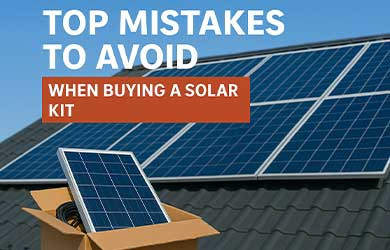Investing in a solar kit (or solar power panel kit) is an excellent step towards cleaner, more affordable energy. But errors made in selecting the right kit will cost you efficiency, money, and peace of mind. For people who are considering buying a kit, here are a few mistakes one must avoid.
1. Not Considering Authenticity and Certifications
One must verify the authenticity of the solar kit before purchasing it. Going for a substandard quality may provide temporary benefits, but it will not be long-lasting. Make sure to look for:
- Serial numbers matching on panel, package, and invoice.
- Check for certifications like BIS, IEC, and MNRE.
2. Inappropriately sized Solar Kit
Most customers underestimate the capacity they require. Choosing a kit of the right size helps meet the power requirements.
Critical blunders include:
- Not analyzing current usage (appliances, peak loads).
- Not taking future growth into account (if you’re adding ACs, EV chargers, etc.).
- Misjudging roof space or tilt/slope such that panels cannot be optimally placed.
3. Ignoring Quality and Technical Characteristics
Not only the capacity of the solar panel kit, but also its components must be checked when exploring the solar kit. Some common errors:
- Selecting panels with lower efficiency, thin glass, or no anti-reflective / anti-weather coating.
- Selecting inverters that cannot handle surges, have inferior cooling, or are undersized.
- Check for the quality of wiring and cable components such that there are no losses and they offer resistance to heat or water.
4. Underestimating After-Sales Support & Warranty
No matter how good a solar power panel kit is, it will not perform at its best if maintenance and support are overlooked. One must avoid:
- Purchasing solar kits from brands that offer poor after-sales service.
- Not reading exactly what’s given in the guarantee and warranty cards, what is covered (power output, physical defects), the duration of warranty, guarantee, and how the claims must be processed.
5. Inadequate Installation Practices
A solar kit is worthless if installed improperly. Typical errors include:
- DIY installations are often carried out without a professional evaluation, resulting in improper electrical work and unsafe installation.
- The roof isn’t as sturdy as expected to support panel weight.
- Incorrect orientation or tilt, causing shadow, thus decreasing output.
- Wiring incorrectly, excessive cable runs without taking into account the resistance losses. Junction box and inverter location considerations.
6. Overlooking Maintenance & Performance Monitoring
A solar panel kit is not "set and forget." Avoid:
- Allowing dust, grime, and bird droppings to build up on panels. (Cleanliness of the glass is important.)
- Overlooking initial damage signs: micro-cracks, rusty connectors, frayed cables.
- Not checking the overtime system output to identify dips in performance or inverter problems.
Purchasing a solar kit, be it a complete solar kit or a solar power panel kit, is only worthwhile if you steer clear of the common mistakes listed above. Authenticity, accurate sizing, quality components, solid warranty and service, proper installation, and routine maintenance are all necessary. If you are contemplating Waaree Tech solutions, you benefit from a well-established brand, solid manufacturing credentials, comprehensive product testing, recommended after-sales support, and widespread distribution channels.
Frequently Asked Questions
1. What wattage solar kit (solar power panel kit) should I install on an average Indian house?
It varies with your everyday energy usage (in kWh). Compute your monthly load, factor in peak wattage and then include a margin for expansion. An average 3-5 kW package should be enough for small homes with medium electrical loads.
2. What is the warranty period on Waaree solar kits/panels?
Waaree provides performance warranties (usually 25 years on modules) and product warranties against defects. Refer to model-specific warranty information always.
3. Can I install a solar kit myself?
It's not recommended unless you possess electrical / roofing knowledge and all protective gear.
4. How do I check if a panel or solar kit is original?
Seek serial numbers to match, proper certifications (BIS, IEC, MNRE), genuine brand stamps, apparent build quality, and availability of a proper warranty card and bill of solar power panel kit to check for authenticity.
5. How frequently should I inspect or maintain my solar kit?
Periodic inspections every 6 months are good practice. Clean the panels when visibly dirty (or every few months), check wiring, inverter operation, ensure no shading, and verify power outputs. Waaree’s maintenance guidance highlights these.

